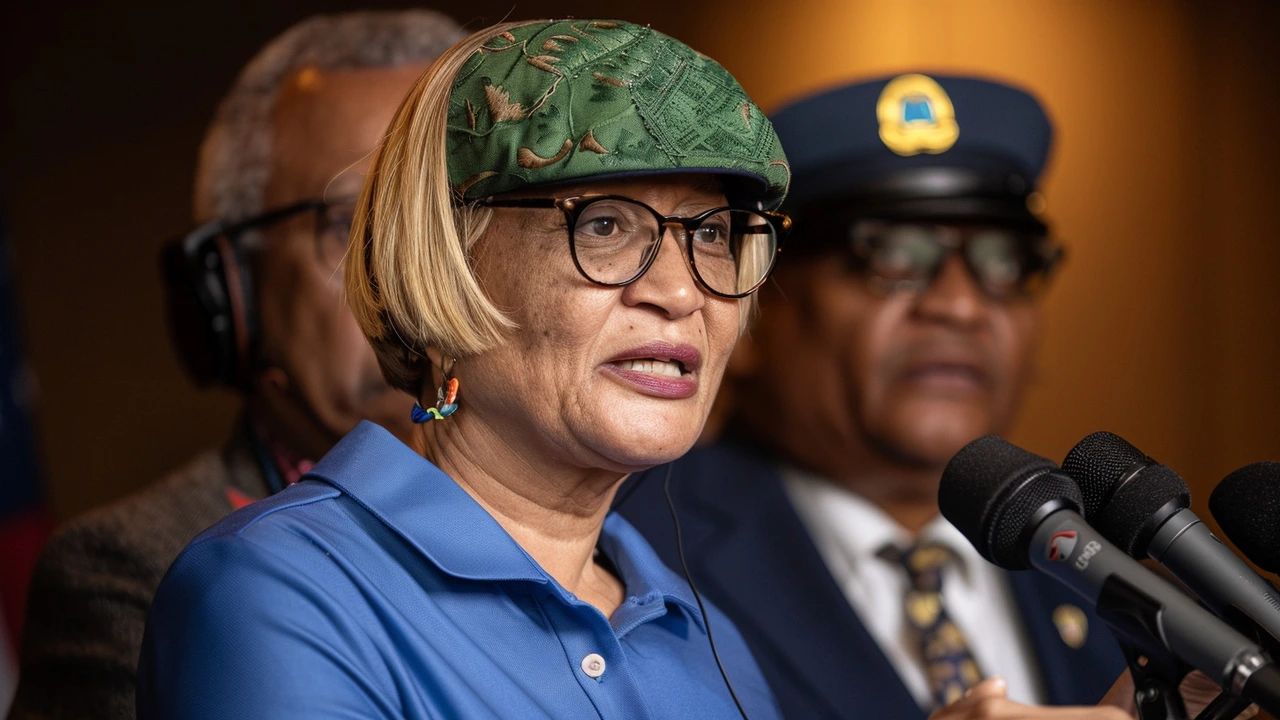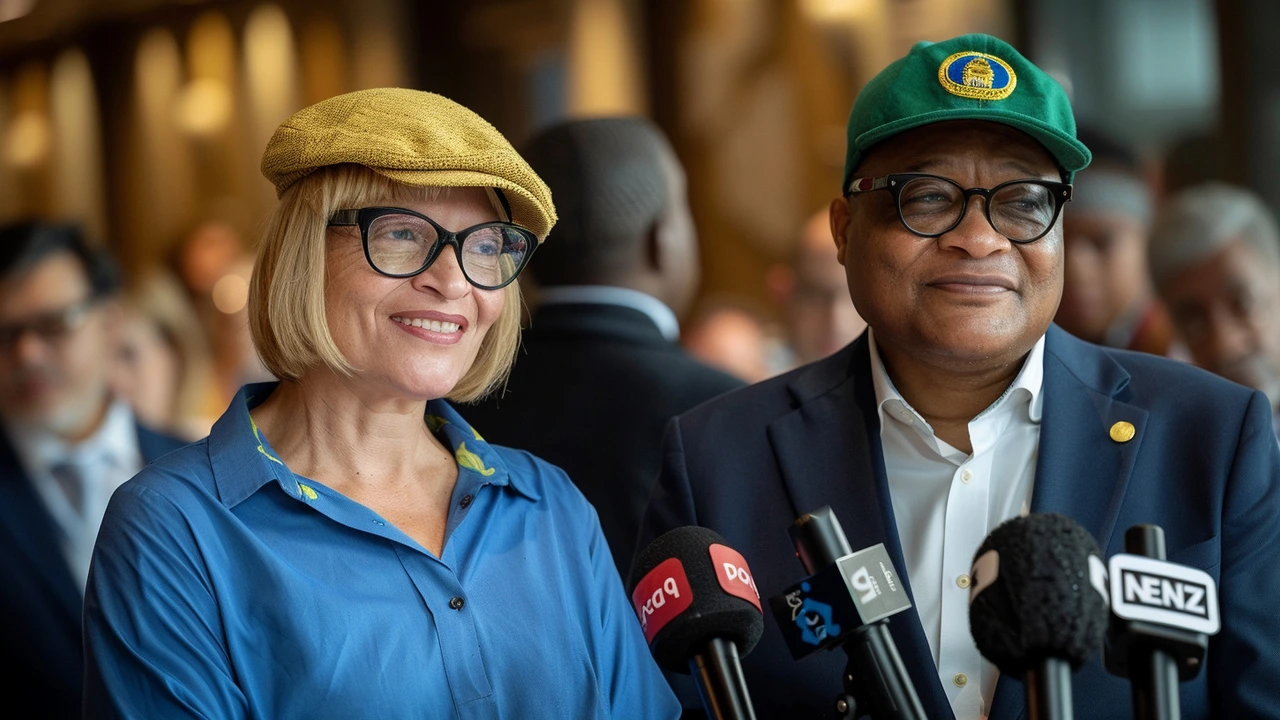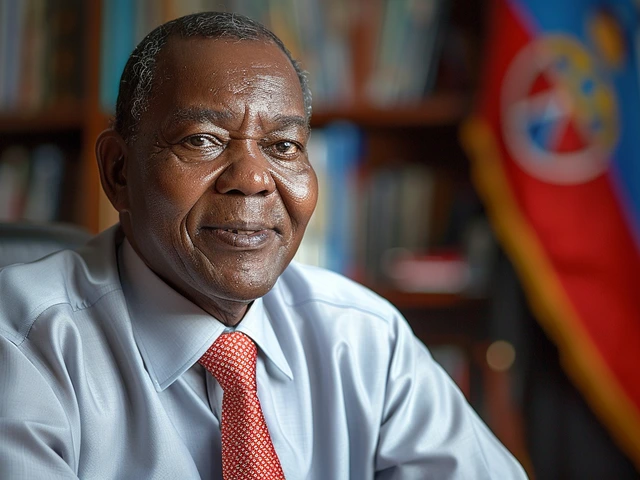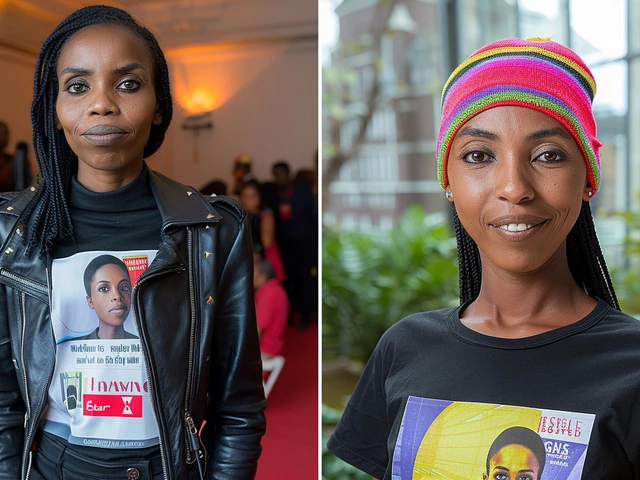The political landscape in South Africa is currently witnessing a significant clash between two prominent figures: ANC secretary-general Fikile Mbalula and DA federal chair Helen Zille. The heart of their disagreement is the interpretation of the terms governing the Government of National Unity (GNU), an arrangement that aims to bring together multiple parties to form a cohesive governance structure. This clash has opened up conversations about the roles and responsibilities each party holds within this framework, and it’s clear that navigating these waters is proving to be no easy task.
Mbalula's Stance on Decision-Making
Fikile Mbalula, representing the ANC, has taken a firm position on the matter. According to Mbalula, the ANC has the authority to make decisions within the GNU without requiring the DA's approval. He bases his claim on the fact that the DA does not possess veto power and that significant decisions are made on a broad-based 60% threshold encompassing all participating parties. Mbalula's remarks suggest that the ANC feels it has enough leverage within the GNU setup to move forward without needing unanimous agreement, a stance that he believes will keep doors open to any party interested in joining the GNU.
Zille's Call for Consensus
On the other end of the spectrum, Helen Zille of the DA paints a very different picture. Zille firmly believes that consensus among all GNU parties is required, particularly for cabinet decisions and when considering the inclusion of new partners into the unity government. According to her, the agreement and cooperation of existing GNU parties are crucial, and any attempt to bring in new parties without this consensus would not only disrupt the balance but also undermine the trust among the current members. She emphasizes that President Cyril Ramaphosa must consult with party leaders when appointing cabinet members, ensuring that everyone is on the same page and that the integrity of the GNU remains intact.

The Role of Existing Partnerships
The GNU is already a complex and dynamic entity, including the ANC, DA, IFP, GOOD party, and Patriotic Alliance. With such a diverse collection of political interests and ideologies, it’s no surprise that tensions like these arise. Each party brings its own agenda to the table, and finding common ground is a continuous challenge. Zille’s concern is that adding new parties without existing members’ consensus could lead to unwarranted complications and possible fractures within the GNU. It is this perspective that is driving her call for a more collaborative approach, one where every decision is made with mutual agreement and respect.
Navigating GNU Challenges
The current standoff between Mbalula and Zille underscores the broader challenges faced by the GNU. The framework was designed to foster unity and collective governance, but achieving these ideals in practice is proving to be arduous. The appointment of cabinet members is especially contentious, as it involves significant power dynamics and the balancing of various party interests. Mbalula’s viewpoint reflects a more majoritarian approach, where the ANC’s substantial influence can steer the ship, albeit at the risk of alienating smaller parties. Conversely, Zille represents a more inclusive and cautious approach, prioritizing consensus and stability over unilateral actions.

Potential Implications for GNU
If the discord between Mbalula and Zille remains unresolved, it could have far-reaching implications for the GNU. A lack of cohesion could weaken the collective decision-making process, making it more challenging to implement policies effectively. Furthermore, public perception of a divided government could erode trust in the GNU’s capacity to govern. It is essential for the parties involved to find a middle ground, one that respects the contributions and concerns of all members while allowing the GNU to function efficiently. The ongoing dialogue between Mbalula and Zille will likely play a pivotal role in shaping the future of the GNU.
The South African political scenario has always been vibrant and loaded with varying perspectives. The conversations between Mbalula and Zille are a testament to the dynamic nature of the country's political environment. As discussions continue, it will be fascinating to see how these leaders navigate their differences and what compromises or adjustments will be made in the GNU framework. For now, all eyes are on these political heavyweights as they grapple with the intricate task of unifying diverse political entities under a single banner.
The Path Forward
Moving forward, it will be imperative to observe how the different parties involved in the GNU adapt to these disagreements. Will the ANC push forward with its majoritarian approach, or will Mbalula find common ground with Zille’s call for consensus? The dialogues and decisions in the coming months will provide critical insights into the functioning and sustainability of the GNU. South Africa’s journey with a Government of National Unity is a relatively new experiment in its democratic evolution, and how effectively it can juggle the multitude of political voices will determine its legacy.
In conclusion, the open debates and discussions between figures like Mbalula and Zille are crucial for the health of any political arrangement. It ensures that all voices are heard, and through structured dialogue, a path forward can be charted. While disagreement may seem destabilizing in the short term, it can often lead to stronger, more resilient structures in the long run. For now, the key is to keep the conversation going and to focus on the common goal of a united, prosperous South Africa.







Posts Comments
MAYANK PRAKASH June 20, 2024 AT 23:24
Man, this GNU thing is like herding cats with a PowerPoint presentation. Everyone wants a seat at the table, but nobody wants to clean up after the party. Mbalula’s got the numbers, Zille’s got the principles-both are right, but neither is willing to bend. South Africa needs more compromise, not more press releases.
Aashna Chakravarty June 21, 2024 AT 08:26
ANC is just using GNU as a cover to keep power. Zille’s not wrong-but she’s also not innocent. The DA spent years blocking every progressive policy under the sun. Now they want a veto? Please. This is just political theater for the global media. 🤡
dharani a June 22, 2024 AT 21:41
Guys, I read the GNU agreement three times. It doesn’t say anything about vetoes. It says ‘consultation’ and ‘mutual respect.’ So Mbalula’s technically correct, but Zille’s just being smart. Why fight over semantics when we could actually govern?
Jinky Palitang June 23, 2024 AT 14:34
Can we just admit that 60% is a magic number invented so the ANC doesn’t have to listen to anyone? Also, why is the IFP still in this? They haven’t done anything since 1994 except show up for photo ops. 🤷♀️
Sandeep Kashyap June 24, 2024 AT 03:57
Look-I get both sides. But let’s not forget why GNU was created: because no single party can fix SA alone. Zille’s right to demand inclusion. Mbalula’s right to lead. But leadership isn’t domination. It’s listening. We need leaders who remember they work for the people, not the party.
Vinaya Pillai June 26, 2024 AT 01:44
Oh wow. So now consensus means ‘do what Zille says’? 😏 Meanwhile, the ANC is trying to keep the country from collapsing. Maybe if the DA spent less time tweeting about ‘ethical governance’ and more time fixing schools, we wouldn’t be here.
Kashish Sheikh June 26, 2024 AT 07:29
Y’all are overcomplicating this. It’s not about power-it’s about trust. If the ANC brings in a new party without consulting the others, it’s like inviting someone to your wedding after the cake’s been cut. You don’t do that. You talk first. 💛
dhawal agarwal June 27, 2024 AT 02:18
History teaches us that coalitions built on fear or force collapse. Those built on shared dignity endure. The GNU isn’t a chess match-it’s a covenant. Mbalula’s strategy may win the next election, but Zille’s vision might save the republic. Choose wisely.
Amar Sirohi June 28, 2024 AT 07:50
One cannot help but observe that the structural tension between majoritarian expediency and consensual governance is not merely a South African dilemma, but a reflection of the broader post-liberal democratic crisis wherein the very notion of pluralism is being weaponized by those who claim to defend it, thus creating a paradox wherein the mechanism designed to unify becomes the instrument of its own fragmentation-a dialectical impasse where power, in its most naked form, asserts itself as legitimacy, while legitimacy, in its most refined form, demands surrender to the collective will, and therein lies the tragedy of modern governance: the inability to reconcile the will of the many with the rights of the few, without either descending into tyranny or dissolving into chaos.
Elizabeth Price June 29, 2024 AT 20:13
Wait-so the DA, the party that spent 20 years opposing affirmative action, now wants veto power? That’s like a arsonist demanding fire safety oversight. Also, ‘consultation’? What does that even mean? A Zoom call? A signed memo? A handshake? Define it. Or shut up.
Nagesh Yerunkar June 30, 2024 AT 04:25
ANC = corruption. DA = hypocrisy. IFP = irrelevant. GOOD = confused. Patriotic Alliance = meme. GNU = joke. 60%? More like 60% of voters didn’t even vote. This whole thing is a distraction while the country burns. 🤡🔥
Daxesh Patel June 30, 2024 AT 17:54
Just FYI-the GNU agreement says ‘broad-based consensus’ not ‘unanimous consent.’ So Mbalula’s right on the letter. But Zille’s right on the spirit. Also, ‘cabinet appointments’ are mentioned in Section 4.2-needs joint recommendation. So both are kinda right. 😅
Mahesh Goud July 2, 2024 AT 05:10
Who do you think is funding Zille? The IMF? The US embassy? The same people who told Mandela to give up the land? This isn’t about consensus-it’s about control. The ANC is trying to fix the economy. The DA wants to keep the old system alive. They’re not debating policy-they’re fighting for survival. And the people? They’re just the audience.
mahesh krishnan July 2, 2024 AT 14:54
Simple: ANC big. DA small. So ANC decides. End of story. Why make it hard? Everyone knows who runs this country. Stop pretending.
Ravi Roopchandsingh July 4, 2024 AT 03:51
They’re lying. You think this is about GNU? Nah. They’re hiding the fact that the ANC is selling state assets to China. Zille knows. That’s why she’s fighting. The whole GNU is a smoke screen. 🕵️♂️🇨🇳
Akash Mackwan July 4, 2024 AT 09:11
Why is everyone acting like this is the first time two politicians disagreed? This is politics. It’s messy. It’s loud. It’s ugly. And if you think consensus is easy, you’ve never tried to get your family to pick a restaurant. The fact that they’re even talking? That’s progress. Let them fight. Let them figure it out. We’ve survived worse.
Write a comment